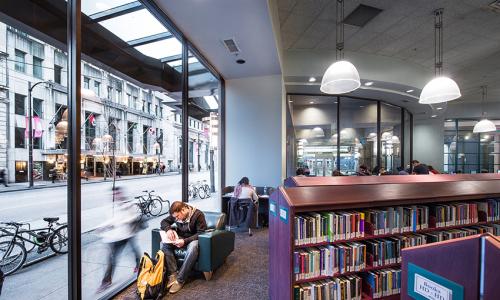
As a student currently in my last semester at SFU, I can definitely relate to feeling a mixture of both excitement and trepidation towards life after university. Before starting my final year, graduation had always seemed so far off into the future that I never spent much time thinking about it. Sure, I had participated in the Co-operative Education program as well as volunteer work in order to gain career-related experience, but it was not until the realization that my cushy student life was nearing its end that I began to feel quite anxious about graduation. Mainly this is because despite nearing the end of my studies, I still remained undecided about my career path, and I was really struggling with making a decision about what to do next.
The anxiety-inducing question of "what next" is a common dilemma faced by many students as they approach graduation. However, one thing that I have found to be particularly helpful in determining the right career path to pursue has been "informational interviews."
What is an informational interview? Informational interviews are a truly excellent resource for both students and recent graduates as they provide the opportunity to learn about an occupation of your interest by meeting with someone currently working in that field.
Benefits of Informational Interviews
-
Information interviews are not job interviews. Therefore, by alleviating the stress and pressure of a job interview, information interviews provide a stress-less environment where students can gain valuable information and insight into a particular occupation
-
Students are able to make more informed decisions when choosing an occupation
-
Gain valuable advice on how to break into the field and gain entry into the job market
-
Provide a firsthand account of what it's like to work in the chosen field
-
A great networking opportunity to gain professional contacts that can benefit you throughout your post-graduate job hunt
Tips for Setting Up an Informational Interview
-
Reach out to family, friends, teachers and co-workers to see if they know anyone working in the field you are interested in. For example, I was interested in learning about Human Resource Management, so I reached out to family and friends who work at companies that have HR departments and asked if they would be interested in setting up a meeting
-
Conduct your own research and contact people with interesting jobs that are currently working in your field of interest. I have found that the majority of people are highly receptive to the idea of meeting with students for information interviews
Remember, it is important to treat an informational interview as if it were a job interview. Be professional, dress appropriately, prepare a list of questions you want to ask and bring paper and pen to take notes. It is also never a bad idea to send a thank you card after the interview. Keep in mind the importance of making a good impression as informational interviews are great networking opportunities that may provide leads to job opportunities after graduation.
Overall, my personal experiences with informational interviews have been extremely positive. Each person that I have met with has been enthusiastic and genuinely interested in sharing advice and insight with students. For instance, an interview I had at Global even involved a tour of the building and the privilege of watching a taping of Global National from the control room, which was a really fun experience!
Most importantly, informational interviews have provided me with invaluable information that has been extremely helpful in determining my career path, and greatly alleviated much of the anxiety I was feeling about graduation (or at least until the dreaded job hunt commences). As an added bonus, informational interviews can be a great resource for gaining some highly desirable tips on how to successfully access the hidden job market and excel at job interviews.














